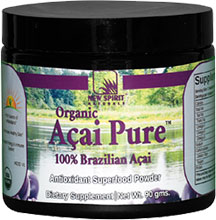
Acai Pure
An Organic Rain Forest Antioxidant Superfood
Acai is considered one of the most nutritious fruits on the planet, packed with antioxidants, vitamins, essential fatty acids (EFA), fiber and amino acids. Acai is an anti-aging superfood, containing phytosterols which helps the skin by reducing the erosion of the skin's protective coating and reducing wrinkling.
30 servings, 90 grams powder
retail $49.95 / your cost $37.46
Case of 12 Bottles
retail $569.43 / your cost $427.30
|

|

Product Description
The Acai (ah-sigh-ee) palmberry is found in the Amazon Rainforest in Brazil where it grows atop a
palm tree, Eurerpe oleracea. The Acai is approximately the size of a blueberry. Acai is considered to
be one of the most nutritious fruits on the planet and is packed with antioxidants, vitamins, essential
fatty acids (EFA), fiber, and amino acids.
To prevent oxidation, Acai berries are harvested quickly and processed into a deep purple powder
through a freeze drying process which eliminates the water.
For centuries Acai berries have been used as a part of the local diet. An average person may consume
as much as two liters of Acai fruit each day. The indigenous people of the Amazon have long
used Acai for its energy promoting properties. Acai berries have a taste that can be described as a
delicious mix of chocolate and berry.
Acai berries contain significant amounts of Omega-3 and Omega-6 fatty acids. They also contains high levels of anthocyanins, the plant pigments that give it a purple color. One serving contains more antioxidants than the recommended daily allowance and twice that of the amount found in blueberries. Antioxidants help to prevent cellular damage that causes aging and helps to prevent the development of chronic diseases. Acai berries are a good source of protein and fiber.
|
Products complementary to Acai Pure for a comprehensive rejuvenation program:
ORAC+
For energy, anti-aging, and cellular protection. Oxygen Radical Absorbence
Capacity (ORAC), measures the antioxidant power of foods and nutritional supplements. Use ORAC+ daily to reverse cellular damage caused by free-radicals.
Green Magic
Green Magic contains 17 of the most nutrient dense foods on
the planet to provide a convenient, good tasting way to obtain full spectrum nutrition on a daily basis.
|
|
Analysis of the Acai fruit reveals an impressive nutrient profile enhanced by several well-known antioxidant agents.
A Top Performing Antioxidant
Acai contains Vitamin C and E which are powerful antioxidants with anti-inflammatory properties. Some studies have shown they may help improve asthma and arthritis, as well as, help prevent atherosclerosis, lower the risk of stroke and reduce complications of molecular degeneration in diabetics.
Source of Amino Acids
Acai is a potent source of amino acids; tryptophan, glycine, tyrosine, and phenylaline. These amino acids are essential to the proper balance of brain chemicals and hormones that regulate mood, anxiety, stress response, tendencies
for depression, and sleep pattern.
Source of Vitamin B
Acai is a rich source of B Vitamins, which are essential to healthy brain function. This class of vitamins is especially important to the production of dopamine and serotonin, neurotransmittory chemicals that regulate several mental functions, stress reactions, and sleep.
Magnesium Source
Acai contains magnesium a vital anti-stress mineral important for enhancing the body's capacity to fight free radicals and protect the mitochondria of cells against the effect of oxidative stress.
An Impressive Omega Profile
Acai contains a profile that is similar to olive oil. Studies have shown a strong association between intake of omega-3, omega-9, and oleic acid, and the following conditions; cardiovascular disease, stroke, asthma, arthritis, diabetes, inflammatory bowel disease, cancer, various skin disorders, and molecular degeneration. Acai contains beneficial levels of several EFAs, including oleic acid, linoleic acid (polyunsaturated omega-6), and alpha linolenic acid polyunsaturated omega-3.
Beta Carotene - Vitamin A
Acai is rich in beta carotene, a form of Vitamin A. The British Journal of Nutrition found that a diet low in carotenoids like beta-carotene, diminishes the activity of helper T cells, one of the most important immune cells.
Beta-Sitosterol
Acai is a rich source of beta sitosterol. Studies show that beta-sitosterol is able to enhance immune cell's function. Another study found that beta-sitosterol is especially beneficial to helper T-cell function, resulting in improved NK and T-lymphocyte function.
Anti-Aging Superfood
According to anti-aging expert, Dr. Nicholas Perricone, M.D., the Acai berry is one of the top ten superfoods. It contains phytosterols which help defend the skin by helping reduce the erosion of the skin's protective coating. In addition, phytosterols help regulate lipid balance and reduce wrinkles by protecting the skin's external layers. To retain the skin's suppleness, it needs omega fatty acids like those found in the Acai berry. Plant sterols have been shown the help control cholesterol and act as precursors to many important substances.

